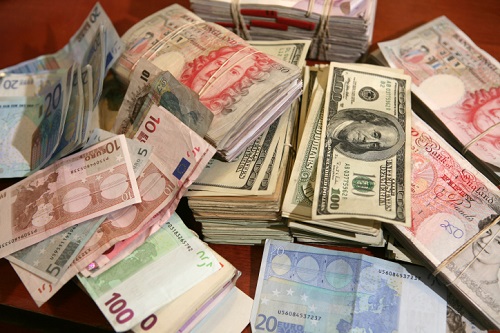Germany has been subsidizing much of Europe for too long. Time for them to emulate the Swiss and ditch the Euro – for everyone's benefit.
The Swiss stopped pegging the Franc to the Euro and will prosper • The Germans, forced to fund multiple countries, would be advised to do the same • And what will happen if Germany goes back to the Deutschemark? • Contrary to doomsayers, economist Gilad Alper thinks it will in fact benefit the German economy

Two weeks ago, the Swiss central bank decided to stop pegging the Swiss Franc to the Euro. The problem was that the Franc was attracting investors from all over the world interested in investing in the currency of the richest and most capitalistic economy in the Western world. But in order to keep the Franc pegged to the Euro, the central bank had to print a huge amount of Francs. The bank's economists balked at the extent of the manipulation, and decided to cut the Franc loose from the Euro and let the local currency fully reflect the strength of the Swiss economy.
The result? The purchasing power of Swiss citizens jumped by 15%.
However, the manipulation of the Swiss Franc pales in comparison to the colossal currency manipulation done within the Eurozone itself. Just as the thriving Swiss economy was hogtied to the ailing European giant – so too Germany, with its rich economy is being held down by weak economies like those of Greece, Portugal, Spain and France. The logic which drove the Swiss away from the Euro is equally valid for Germany. Germany needs to flee the Eurozone, away from the bureaucracy and regulation of Brussels, and most importantly of all – dump the Euro and return to the Deutschemark.
The economic reality is that the Germans – with their high rates of savings, frugal lifestyles and hard work – are effectively funding their neighbors, who are busy cheating on their taxes or planning the next siesta. In fact, the German political leadership's insistence on maintaining the Euro farce, robs its citizens to fund the Mediterranean countries.
Just recently, we saw a striking example of this. The "quantitative easing" declared by the European Central Bank is effectively a huge money printing operation. This new money will be injected into economy in the hope that these virtual pieces of paper will somehow stimulate the economy. Thus the German citizens are earning salaries denominated in a currency that is purposefully being devalued by inflation. Put differently, German politicians are decreasing the purchasing power of their voters and handing it over to foreign non-voters.
What can one explain such a strange phenomenon?
There are political reasons, of course: the ethos of a united Europe, German feelings of guilt and so on. But at least in economic terms, the main explanation is that the German fear of the collapse of the Eurozone and a subsequent return to the Deutschemark. This fear derives in part from the economic weakness of some countries in Europe which are an important export market for Germany. But this is not a serious argument – Germany is supposed to fund bankrupt countries so that they use the money to buy German products? It makes no sense.

Exports Will Do Just Fine
More than anything, the Germans seem to fear a return to the Deutschemark. The Mark, which will reflect the strength of the German economy, will be one of the strongest currencies in the world, along with the Swiss Franc. Therefore, the fear is that export will collapse since consumers around the world won't be able to afford German products – and if German export collapses, then so will German economic prosperity as a whole.
However, the exact opposite is true: returning to the Deutschemark will bring about phenomenal prosperity to Germany. The first reason is that export is only one side of the coin, the other being import. Germany imports almost all of its raw materials, energy, clothing, furniture, consumer electronics, and of course overseas tourism. From the perspective of a German paying in Deutschemarks, the price of these goods and services will crash and the German citizen will become richer, just like the Swiss citizen.
But what of export? Will its collapse not lead to mass unemployment? Well, there might be some damage done to German export, but we need to remember that no-one buys a Mercedes or a BMW for its low price. German industrial machines are also not known for being particularly cheap. The German economy is based on quality and reputation; price will not be the only factor and the effect will be far less than the doomsayers predict.
Indeed, the drop in export may be quite small. The goal of the exporter, like any businessman, is not so much to sell as dearly as possible but rather to make as much profit as possible. Given that the price of raw materials and energy will drop, so will the cost of manufacturing. Since the cost has gone down, the exporter can knock down the price and still make a big profit. So the competitiveness of German export will not really be hurt.
None of this should be news: despite a very strong currency, Japan has enjoyed for decades a large trade surplus because – like Germany – it makes quality products. The future damage to Swiss export due to the strengthened Swiss Franc looks likely to be small to nonexistent. Swatch, Novartis and Roche make products the world needs and is willing to pay handsomely for; competitive advantages will not disappear with a stronger currency.
The most important point is that strong currencies don't come out of nowhere. Free markets beget strong export companies. These companies export their wares bringing in a stream of foreign currency, which strengthens the local currency. The logic of those who support a weak currency is that it is important to weaken the currency in order to save the exporters who themselves are causing the currency to strengthen. This is faulty logic indeed.
And what of the countries dependent on Germany? What will happen when they're cut off? In the long run, a quick cutting off of the German lifeline will actually work to their benefit. Sooner or later, Germany will get sick and tired of funding the irresponsible ways of countries like Spain and France. Better to go into rehab now rather than years down the line when the accumulated damage will have increased to levels that are not manageable. Stated differently, cold turkey is better than an overdose.
Gilad Alper is an analyst with Excellence-Nessuah Brokerage
English translation by Avi Woolf.
To receive updates on new articles in English, join Mida on Facebook or Twitter or join our mailing list.





I read this post fully concerning the resemblance of most recent and earlier
technologies, it's awesome article.
I every time used to study paragraph in news papers but now as I
am a user of net thus from now I am using net for
posts, thanks to web.